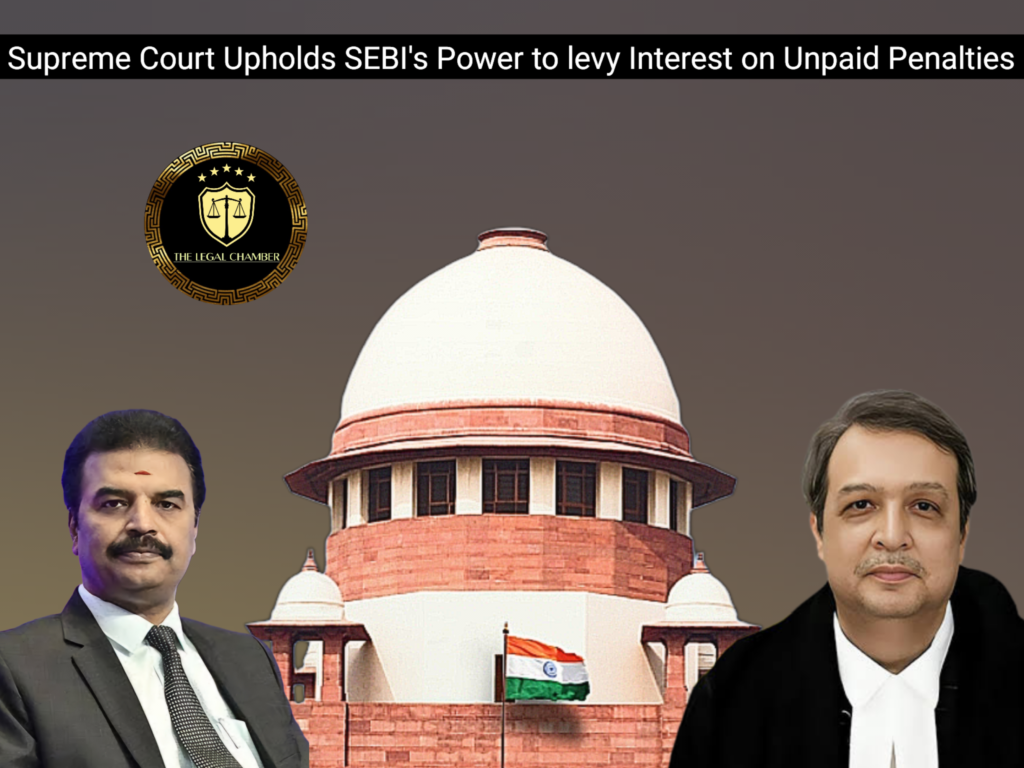
The Supreme Court held that under Section 28A of the SEBI Act, interest on unpaid penalties is recoverable as per Section 220 of the Income Tax Act, 1961, and accrues from the date the penalty becomes payable, not from the date of subsequent demand notices. The Court clarified that the adjudication order itself constitutes a valid demand, and interest is compensatory, not penal, in nature. The insertion of Explanation 4 to Section 28A merely clarified the existing legal position and did not introduce a substantive change. The Tribunal’s dismissal of the appeals was upheld, affirming SEBI’s authority to levy interest from the date of default.
Facts Of The Case:
The appellants, Jaykishor Chaturvedi and others, were promoter-directors of Brijlaxmi Leasing and Finance Limited, a company listed on the Bombay Stock Exchange. SEBI found that they had violated insider trading regulations by purchasing shares between 2012 and 2013. Consequently, SEBI’s Adjudicating Officer imposed penalties on them in 2014. The appellants challenged these penalties before the Securities Appellate Tribunal (SAT) and later the Supreme Court, but their appeals were dismissed in 2019, upholding the penalties.Despite the finality of the adjudication orders, the appellants failed to pay the penalties. In 2022, SEBI issued demand notices for the unpaid amounts along with 12% interest from 2014, followed by attachment notices for their bank and demat accounts. The appellants contested these actions before SAT, arguing that interest could not be levied retrospectively and that recovery proceedings were excessive. SAT dismissed their appeals, prompting them to approach the Supreme Court. The key dispute centered on whether interest on the penalties should be calculated from the date of the original adjudication orders (2014) or the subsequent demand notices (2022). The Supreme Court ruled in favor of SEBI, holding that interest was payable from the date the penalty became due, as per Section 28A of the SEBI Act read with Section 220 of the Income Tax Act, 1961.
Procedural History:
The case originated with SEBI’s adjudication orders dated August 28, 2014, imposing penalties on the appellants for violating insider trading regulations. The appellants challenged these orders before the Securities Appellate Tribunal (SAT), which dismissed their appeals on August 4, 2015. They then filed civil appeals before the Supreme Court, which upheld the penalties in a common judgment dated February 28, 2019.After the penalties remained unpaid, SEBI issued demand notices on May 13, 2022, followed by attachment notices for bank and demat accounts on June 23, 2022. The appellants again approached SAT, contesting the levy of retrospective interest and the recovery proceedings. SAT dismissed their appeals on September 29, 2022, prompting them to file civil appeals before the Supreme Court. The apex court, in its judgment dated July 15, 2025, upheld SAT’s decision, ruling that interest was payable from the date of the original adjudication orders under Section 28A of the SEBI Act read with Section 220 of the Income Tax Act, 1961. The procedural history thus reflects a consistent judicial affirmation of SEBI’s recovery mechanisms.
READ ALSO :Landmark Ruling: Supreme Court Restores Mother’s Custody Based on Psychological Reports
Court Observation:
The Supreme Court made several key observations in its judgment. It held that Section 28A of the SEBI Act, read with Section 220 of the Income Tax Act, 1961, mandates the payment of interest on unpaid penalties from the date they become due, not from the date of subsequent demand notices. The Court emphasized that the original adjudication orders themselves constituted valid demands, making separate demand notices redundant for calculating interest.The Court clarified that the insertion of Explanation 4 to Section 28A in 2019 was merely declaratory and did not introduce any substantive change to the law. It reinforced that interest on penalties is compensatory, not penal, in nature, as it compensates for the delay in payment of lawfully due amounts. The Court rejected the appellants’ argument against retrospective application, noting that the liability to pay interest arises automatically upon default under the statutory framework.Additionally, the Court observed that the adjudication process under SEBI law differs from income tax proceedings, as no separate demand notice is required before recovery. It underscored that the statutory scheme aims to ensure timely compliance and prevent undue delays in payment of penalties. The judgment affirmed SEBI’s authority to recover dues with interest from the date of default, upholding the Tribunal’s decision.
Final Decision & Judgement:
The Supreme Court dismissed the appeals and upheld the Securities Appellate Tribunal’s order, ruling that the appellants were liable to pay interest on the unpaid penalties from the date of the original adjudication orders (August 28, 2014) rather than from the subsequent demand notices (May 13, 2022). The Court held that Section 28A of the SEBI Act, read with Section 220 of the Income Tax Act, 1961, clearly established this liability, with the adjudication orders themselves constituting valid demands for payment. The bench rejected the argument that Explanation 4 to Section 28A (inserted in 2019) had retrospective effect, clarifying that it merely affirmed the existing legal position. The Court directed the appellants to pay the outstanding interest within 15 days, emphasizing that such interest was compensatory in nature, designed to offset the loss caused by delayed payments to the public exchequer. The judgment reinforced SEBI’s recovery mechanisms and settled that statutory dues attract interest from their original due date, not from when formal recovery proceedings commence.
Case Details:
Case Title:Jaykishor Chaturvedi & Others vs. Securities and Exchange Board of India (SEBI) Citation:2025 INSC 846 Civil Appeal No.:Civil Appeal Nos. 1551-1553 of 2023 Date of Judgment:July 15, 2025 Judges/Justice Name:Justice R. Mahadevan & Justice J.B. Pardiwala
Download The Judgement Here